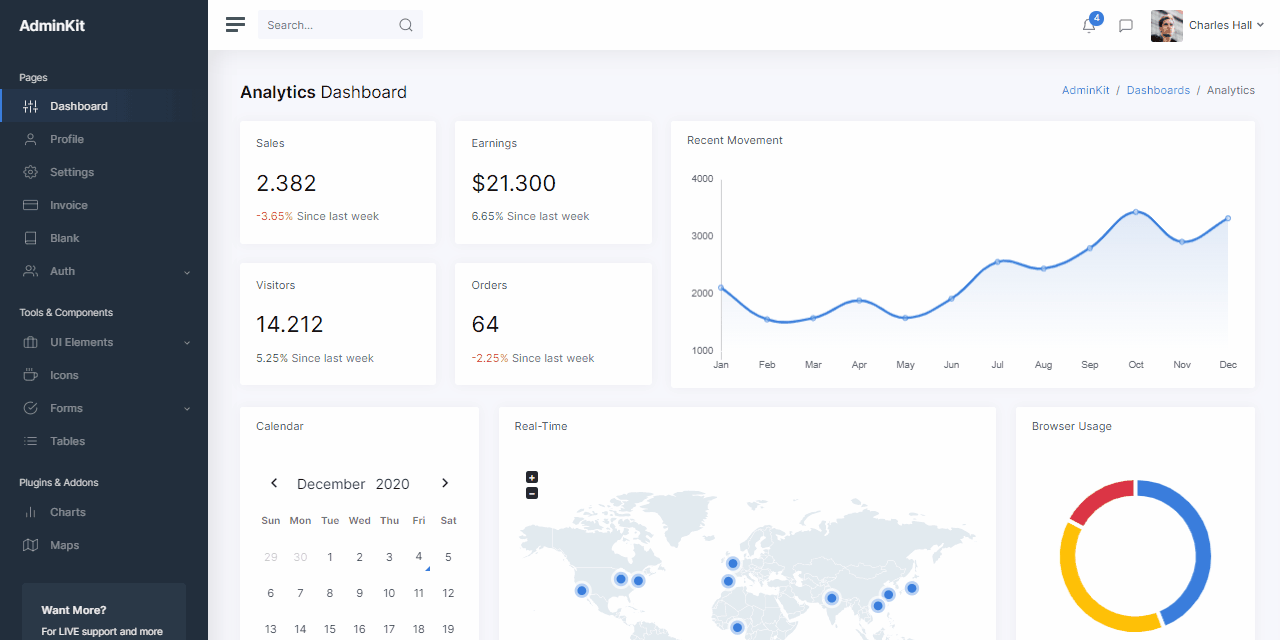Jinja Template project generated by AppSeed on top of a modern UI Kit. The project is a super simple Flask project WITHOUT database, ORM, or any other hard dependency. The project can be used as a codebase for future project or to migrate the Jinja files and assets to a legacy Python-based project that uses Jinja as template engine (Flask, Bottle, Django).
Features:
- UI Kit: AdminKit (Free Version) by AdminKit.io
- Render Engine: Flask / Jinja2
- Deployment scripts: Docker, Gunicorn/Nginx, HEROKU
- Support via Github (issues tracker) and Discord.
Links
- LIVE Demo - starter in action
- Jinja Template - more starters provided by AppSeed
AdminKit by AdminKit.io
A professional package that comes with hundreds of UI components, forms, tables, charts, pages and icons. Built on top of Bootstrap 5.
Built with Bootstrap 5 Built on top of the latest version of Bootstrap 5 and HTML5, which means - robust, responsive and easy to customize.
Dev-to-dev support Our themes are supported by specialists who provide quick and effective support. Usually an email reply takes <24h.
AdminKit PRO available AdminKit PRO contains over 500+ UI Components ranging from forms and inputs to advanced table and calendar components.
Links
- AdminKit - product page
- AdminKit PRO - the premium version (more components, pages and PREMIUM support)
$ # Clone the sources
$ git clone https://github.com/app-generator/jinja-adminkit.git
$ cd jinja-adminkit
$
$ # Virtualenv modules installation (Unix based systems)
$ virtualenv env
$ source env/bin/activate
$
$ # Virtualenv modules installation (Windows based systems)
$ # virtualenv env
$ # .\env\Scripts\activate
$
$ # Install requirements
$ pip3 install -r requirements.txt
$
$ # Set the FLASK_APP environment variable
$ (Unix/Mac) export FLASK_APP=run.py
$ (Windows) set FLASK_APP=run.py
$ (Powershell) $env:FLASK_APP = ".\run.py"
$
$ # Set up the DEBUG environment
$ # (Unix/Mac) export FLASK_ENV=development
$ # (Windows) set FLASK_ENV=development
$ # (Powershell) $env:FLASK_ENV = "development"
$
$ # Run the Jinja Template
$ # --host=0.0.0.0 - expose the app on all network interfaces (default 127.0.0.1)
$ # --port=5000 - specify the app port (default 5000)
$ flask run --host=0.0.0.0 --port=5000
$
$ # Access the UI in browser: http://127.0.0.1:5000/The project has a simple structure, represented as bellow:
< PROJECT ROOT >
|
|-- app/__init__.py
|-- app/
| |-- static/
| | |-- <css, JS, images> # CSS files, Javascripts files
| |
| |-- templates/
| | |
| | |-- includes/ # Page chunks, components
| | | |
| | | |-- navigation.html # Top bar
| | | |-- sidebar.html # Left sidebar
| | | |-- scripts.html # JS scripts common to all pages
| | | |-- footer.html # The common footer
| | |
| | |-- layouts/ # App Layouts (the master pages)
| | | |
| | | |-- base.html # Used by common pages like index, UI
| | | |-- base-fullscreen.html # Used by auth pages (login, register)
| | |
| | index.html # The default page
| | login.html # Auth Login Page
| | register.html # Auth Registration Page
| | page-404.html # Error 404 page (page not found)
| | page-500.html # Error 500 page (server error)
| | *.html # All other pages provided by the UI Kit
|
|-- requirements.txt
|
|-- run.py
|
|-- ************************************************************************The project comes with a basic configuration for Docker, HEROKU, Gunicorn, and Waitress.
Docker execution
The steps to start the template using Docker:
Get the code
$ git clone https://github.com/app-generator/jinja-adminkit.git
$ cd jinja-adminkitStart the app in Docker
$ sudo docker-compose pull && sudo docker-compose build && sudo docker-compose up -dVisit http://localhost:5005 in your browser. The app should be up & running.
Steps to deploy on Heroku
- Create a FREE account on Heroku platform
- Install the Heroku CLI that match your OS: Mac, Unix or Windows
- Open a terminal window and authenticate via
heroku logincommand - Clone the sources and push the project for LIVE deployment
$ # Clone the source code:
$ git clone https://github.com/app-generator/jinja-adminkit.git
$ cd jinja-adminkit
$
$ # Check Heroku CLI is installed
$ heroku -v
heroku/7.25.0 win32-x64 node-v12.13.0 # <-- All good
$
$ # Check Heroku CLI is installed
$ heroku login
$ # this commaond will open a browser window - click the login button (in browser)
$
$ # Create the Heroku project
$ heroku create
$
$ # Trigger the LIVE deploy
$ git push heroku master
$
$ # Open the LIVE app in browser
$ heroku openGunicorn 'Green Unicorn' is a Python WSGI HTTP Server for UNIX.
Install using pip
$ pip install gunicornStart the app using gunicorn binary
$ gunicorn --bind 0.0.0.0:8001 run:app
Serving on http://localhost:8001Visit http://localhost:8001 in your browser. The app should be up & running.
Waitress (Gunicorn equivalent for Windows) is meant to be a production-quality pure-Python WSGI server with very acceptable performance. It has no dependencies except ones that live in the Python standard library.
Install using pip
$ pip install waitressStart the app using waitress-serve
$ waitress-serve --port=8001 run:app
Serving on http://localhost:8001Visit http://localhost:8001 in your browser. The app should be up & running.
- Flask Framework - The official website
Jinja AdminKit - Provided by AppSeed Web App Generator.
